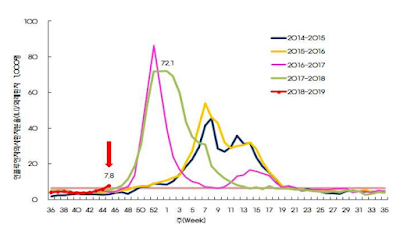#13,680
Two years ago South Korea's CDC announced the start of their winter flu epidemic on December 8th, last year it was December 1st, and this year it has kicked off even earlier - November 16th.
So far, Hong Kong and Japan report low levels of influenza activity, as have the United States and most of Europe. We should get new reports later today from our own CDC and from Public Health Canada.While flu epidemic onset and severity can vary around the globe. this is a good reminder that now is the time to get the flu shot if you haven't already, as we often see a big uptick in flu activity in the United States between Thanksgiving and Christmas.
So far, what little activity we've seen has been primarily A/H1N1, a strain that the flu vaccine is generally pretty effective against. It takes a couple of weeks for immunity to kick in, however.Some excerpts from today's Korean CDC announcement follow:
(translated)
Disease Control Division, Influenza Epidemic Notice
November 16, 2018 (Fri) Notice of influenza epidemic
◇ Recommendation for influenza vaccination and suspected symptom treatment
◇ Personal hygiene compliance orders such as hand washing, cough manners etc. to prevent infection and spread
The Ministry of Health, Welfare and Family Affairs (Jung Eun-kyoung) has issued the influenza epidemic on November 16, 2018, after 45 weeks (11.4 ~ 11.10) We called for compliance with personal hygiene regulations such as immunization, proper hand washing, and keeping cough manners.
* Influenza-like patient: a person with a sudden fever of more than 38 ° C with a cough or sore throat
** 2018-2019 season influenza strain criteria: 6.3 people / 1,000 people (6.7 people in the 2017-2018 season)
(Formula for influenza epidemics: ILI fraction + 2 × standard deviation for non-epidemic influenza over the past three years)
In addition, even if the epidemic has started to prevent and prevent the spread of influenza, the non-vaccine recipient will repeatedly be asked to receive the influenza vaccine,
* Influenza vaccination rate: 66.9% of children aged 6 months to 12 years old, 82.7%(Continue . . . )
